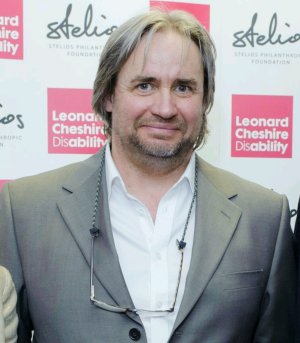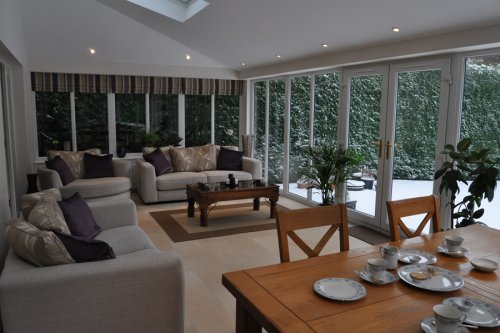
Q& A with James King: how to build a successful business around your disability
Disability Horizons contributor Nichola Daunton talks to James King, owner of Oliver James Garden Rooms and winner of the Stelios Award for Disabled Entrepreneurs 2013, about building a business around his disability.
Please could you tell Disability Horizons’ readers a bit about yourself and your business?
 I’m a 47 year old father of three, living in Milton Keynes and I’ve been registered as blind since 1998. After leaving school, I started working on a building site as a bricklayer while also studying for my City and Guilds Bricklaying qualifications.
I’m a 47 year old father of three, living in Milton Keynes and I’ve been registered as blind since 1998. After leaving school, I started working on a building site as a bricklayer while also studying for my City and Guilds Bricklaying qualifications.
I realised quite early on that my main strength lay in organising other people rather than the physical art of bricklaying itself. So I started managing a team of builders and built several businesses up from there.
My Eureka moment regarding my business came on a winter’s day, when I was working at home. I thought I’d sit in our conservatory and do the paperwork. I opened the doors, walked across the cold floor and turned on the portable heaters. I went back a while later and it was still cold, so I turned on another heater and turned up the radiator.
This had become the norm and up until that moment I’d not given it much thought. But this time I sat down and said to myself: this room just isn’t working. Why should I have to have two electric heaters to compensate for a radiator? Why should we have a set of doors between our home and the conservatory? Why do we buy these structures?
I began asking friends whether they had the same situation and the answer was yes, regardless of the price of the conservatory.
With my knowledge of design and build I started to sketch out some ideas. What if we could have warm roofs and warm floors, skylights that let in as much light as required, and doors that opened the whole width of the room to the garden. There would be no separating doors, we could just take the wall out from the home to the new room.
I realised that all this was achievable – with the build and design process I had devised, we would be able to keep the rooms cool in the summer. This was why we started Oliver James Garden Rooms, and so much has evolved from it since.
You were working in the building industry when you were diagnosed with Retinitis Pigmentosa, how did you cope with the diagnosis?
At the time I was managing a brickwork company and I was devastated.
I’d just bought my first house and was living with a girlfriend. Because I’d moved, I had to get a new GP. My new doctor asked me if I had any issues, so during my general check-up, I said I struggled to see in the dark and suffered with spots in my eyes. He referred me to Moorfields Hospital.
They tested me and then asked me to gather my whole family together and bring them down to the hospital for a meeting. That was where I received the news. I was diagnosed at age 21 and I was told I’d be completely blind by the age of 40.
To be honest, I sort of ignored it and carried on. I didn’t feel that I had a choice but to carry on. But at age 31, as Oliver James Garden Room was taking off, hospital appointments became more frequent and my peripheral vision results were poor. That was it, I couldn’t drive after that.
How important was it to you to build your business around your disability?
Very important. I’ve never felt particularly ‘employable’ to other people, so I have had to make the business work for me and for my employees. If I don’t get this right, then no-one is going to suddenly hand me a job on a plate.
I am planning for the future too. I’m putting systems in place so that if my son takes over the business or my eyesight deteriorates further, the business will still be in great shape and run like clockwork.
You are also dyslexic, how has this affected the way in which you run your business?
I only found out in my thirties that I was dyslexic, when I took my eldest son, aged 10 at the time, to be tested for dyslexia. When the experts explained to me what he was experiencing and how he was coping at school, everything suddenly slotted into place and I realised that I was also dyslexic.
My dyslexia and eye condition have made me realise that I can’t do everything, and that’s a real bonus in many ways. I know that I’m better at verbal communication than written text, so I’m more likely to pick up the phone and talk to people than send long emails.
I’m also conscious of getting things right when it matters. It makes me happier to oversee and delegate certain tasks. I get the best people for the job, for example to prepare our presentations or our brochures. I don’t try to do everything.
What does winning the Stelios Award for Disabled Entrepreneurs mean to you?
Kudos. It’s a huge lift when you think that a billionaire can see your business future and believes in you. That’s quite something.
I want to be able to be an example, to show others facing challenges that it can be done. I was also very fortunate that my two eldest children were there to see me receive the award from Sir Stelios. I hope it inspires them too.
You got down to the final three in 2012, but didn’t win that year. What do you think made the difference this time around?
Going back and showing what we learned from our first application as well as not giving up and trying again. We showed our tenacity and perseverance. It was also really gratifying to show the improvements that we’ve made to the business since last year’s application.
What does the £50,000 prize money mean for the future of your business?
We’ve already made inroads into expansion. We’re employing two new members of staff – business development and sales people. We’re also working on a design manual to document all stages of our different construction processes. It means that we can concentrate on future growth and move forward.
What advice would you give to other disabled people looking to set up their own business?
Start it tomorrow.
Disability is becoming more accepted, more mainstream – whether that’s because of the Paralympics or through children’s television.
We have an ageing population and no one is that far away from disability. Whether a disability is from birth or not, we know that a skiing accident is all it might take for anyone who is able-bodied to become disabled tomorrow.
Don’t look at your disability and think about what you can’t do, look at what you can do. Nelson, who stands at the top of that column in Trafalgar Square, has one arm and one eye but no one sees him as a disabled sailor. He’s the man who changed a nation.
Don’t panic or worry – just try!
You can follow James King on Twitter at: @OJGardenRooms
Find out more about James’ business at: www.oliverjamesgardenrooms.co.uk
By Nichola Daunton
Check out…
• Job shadowing at CNN: encouraging talent no matter what your disability
• Volunteering: new skills and new experiences
• Work and disability: top tips for job hunting
Do you have a successful business you want to tell our readers about? Get in touch by messaging us on Facebook, tweeting us @DHorizons, emailing us at editor@disabilityhorizons.com or leaving your comments below.
